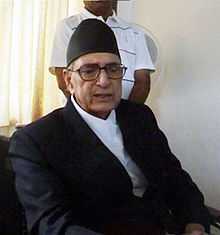Nepalese people of Indian ancestry
| |||||||
| Total population | |||||||
|---|---|---|---|---|---|---|---|
| 4 Million | |||||||
| Regions with significant populations | |||||||
| |||||||
| Languages | |||||||
| Religion | |||||||
| Related ethnic groups | |||||||
Indian Nepalese (Nepali: नेपाली भारतीय) are Nepali people who are citizens or full-time residents of Nepal who has Indian birth or whose ethnic ancestry lie fully or partially in India. They speak many languages and dialects of Nepal, but Urdu language of Nepali dialects (similar to Hindi) also included as one of the official languages of Nepal, is understood and spoken by all.[1]
History
The wave of Indian immigration occurred during the nineteenth and early twentieth centuries. The government of Nepal or its agents encouraged many Indian migrants to move into the Terai for settlement. It also has to beared in mind that most of the borders of Nepal and India lied inside Nepal long ago. So to argue who moved from where is very fuzzy. Still in the early 1990s, this group mostly consisted of landless tenants and farmers from northern India's Darjeeling and border states of Bihar. After the fall of monarchy in Nepal, these poor immigrants managed to acquire citizenship.
Most of the Indian immigrants in Nepal, were primarily agriculturalists, although a majority of them also relied on other activities to produce supplementary income. They generally raised some farm animals, particularly water buffalo, cows, goats, and sheep for domestic purposes. The Nepalese from hills traditionally have occupied the vast majority of civil service positions because of their historical roots but there was very little involvement of Indian immigrants in Nepal's politics as they are recent arrivals.
Religion
The majority of the Indian immigrants to Nepal are Hindus and Muslims. The Hinduism that is practiced by the Nepalese people has been influenced by Buddhism and indigenous folk belief.
A majority of Nepalese Muslims are Indian immigrants. Nearly 97 percent of them reside in the Terai region.
Discrimination
Anti-India sentiment in Nepal is partly driven by history. The root of the problem lies in the settlement of Indian immigrants in the Terai region of Nepal. Indigenous Nepalese people residing mostly in the hill areas have resented their presence. The Tharus and Maithali are the Madhesi people of Nepalese origin inhabiting Terai of Nepal and consider these immigrants as Madhesi people of Indian origin. They feel the Terai population exercises a disproportionate influence over Nepalese politics and economy. They also feel that the Indian immigrants in Terai Region are newly settled, and that there was no existence of them in past.
Notable people
- Parmananda Jha - Vice President of Nepal
- Girija Prasad Koirala - Former Prime Minister of Nepal
- Jamim Shah - Media entrepreneur and the chairman of Channel Nepal Pvt. Ltd
- Yuyutsu Sharma - Writer
- Preeti Kaur - Nepalese pop singer
- Sanjay Thapa - Indian Senior Journalist
See also
- Indo-Nepalese relations
- Nepali Indian
- 1950 Indo-Nepal Treaty of Peace and Friendship
References
| ||||||||||||||||||||||||||||||||||||||||||||||||||||||||||||||||||||||||||||||||||||||



